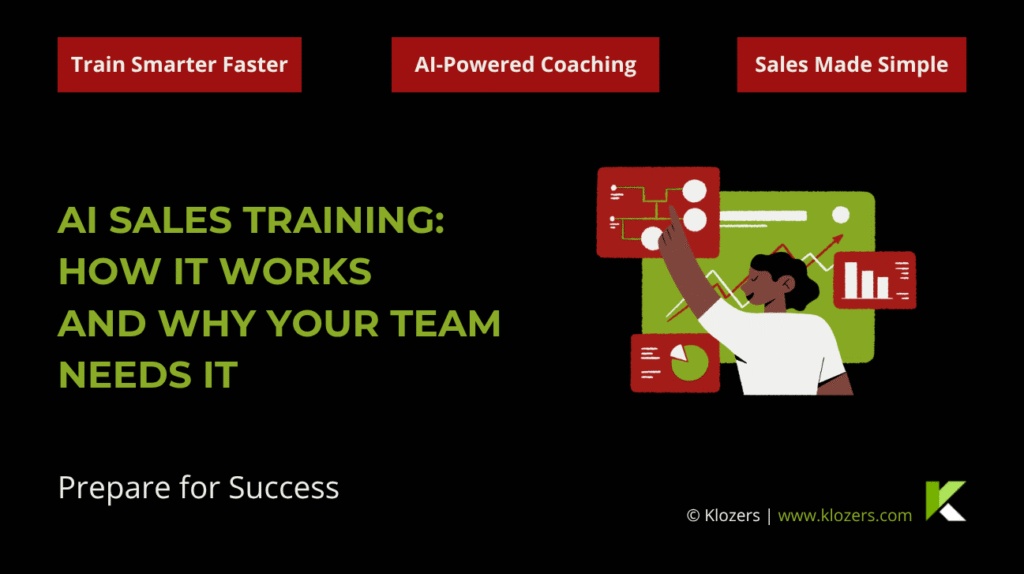How can AI be used for sales - Top Question From Google:
Applications of AI in sales include automating routine data, personalizing communication, forecasting purchasing behavior, providing real-time coaching, and evaluating performance information and data to optimize future performance.
Free access to our best tools and templates
Introduction: AI Sales Training
The old-school spray-and-pray tactics in sales are out. Buyers are more informed, competition is tighter, and your team needs to stay sharp to keep up. That’s where integrating AI in your sales strategy can make a huge difference.
Contrary to what you might hear some pundits saying about AI, it isn’t here to replace salespeople, but to support them. It takes the pressure off by handling repetitive, data-heavy tasks and providing your team with insights they can actually use in real-time. When you use it right, AI sales training can shorten onboarding time and improve performance.
You don’t need to be a tech giant to take advantage of it. AI-powered sales training tools are more accessible than ever, whether you’re a small business or a large sales team.
What is AI sales training?
AI sales training isn’t about replacing people with machines. It’s about helping your team get better, faster. Think of it as smart support, essentially having a virtual sales trainer that’s always available.
Here’s why your investment in AI sales training makes a lot of sense.
Real-time coaching, not just theory
Traditional sales training often happens in one-off workshops. You bring in a trainer, everyone takes notes, and that’s it. Unfortunately, not much changes.
AI sales coaching is different. It integrates into the tools your team already uses (like CRMs and call software) and gives real-time suggestions as reps work. This provides instant feedback on how to handle objections and gives sales reps data on the optimal time to follow up based on buyer behavior.
Tailored to each rep
Every salesperson has different strengths and areas to work on. AI tools can track individual performance and adjust the training experience to fit. If one of your representatives struggles with closing and another with discovery, they’ll each receive coaching tailored to their needs.
Humans still matter
AI can guide, suggest, and automate. But what it fails to do is to build trust or understand emotions like a human. The best AI-powered sales training solutions work alongside human coaching, not instead of it.
Key benefits of using AI in sales training
There are many benefits of implementing AI in your sales strategy. Some of the most important ones include the following.
Faster ramp-up for new hires
As you might have experienced firsthand, training new salespeople can be a slow and expensive process. AI sales training can significantly reduce that time. Instead of shadowing for weeks, your new reps get instant feedback and context-specific support from day one.
Better conversations, better conversions
An AI sales trainer can listen in on sales calls and flag moments where your rep could have said something better or missed a buying signal. Some tools even suggest better phrasing or questions in real time.
Data that actually helps
AI can help you turn messy CRM notes, call transcripts, and email threads into clean insights. It shows which messaging works, what common objections are coming up, and how your deals are actually moving through the pipeline. That means your AI sales coaching gets sharper with every deal.
Always-on reinforcement
One of the biggest problems with sales training is that your people will forget it faster than you might think. AI helps reinforce learning continuously, so your reps aren’t relying on memory, but are building their sales muscle. This spaced repetition strategy sticks, whether it’s through nudges, reminders, or micro-learning moments.
How can you integrate AI into sales process optimization?
Incorporating AI in your sales process does not have to be difficult or tedious. You just need to focus on the areas where it can have the most significant impact and then expand on them.
Here’s what you can do.
Begin with your CRM
Numerous AI-driven tools are already compatible with CRMs. These integrations can interpret activity records, predict the success of deals, and propose follow-ups depending on the success of the previous deals. This helps your sales force stay on track and not miss any opportunities.
Analyze calls and emails using AI
Artificial intelligence, such as Gong, Chorus, and Refract, can analyze sales calls and emails to spot patterns. They can identify typical objections, gauge the mood, and sometimes even suggest how and when to address them. This makes your daily sales discussions a good training tool.
Automate lead scoring and prioritization
AI can eliminate the guesswork in the determination of which leads to follow-up. AI can assist reps in targeting more probable converting leads, based on historical data, behavioral signals, and fit scores.
Provide on-the-spot coaching
Virtual sales trainers can give real-time feedback during calls or while entering notes in a CRM. This kind of AI sales coaching ensures that training isn’t just a one-time event but part of the rep’s daily workflow.
Track and refine with data
One of the biggest strengths of AI is its ability to generate insights over time. Regularly review the data your AI tools provide, what’s working, what’s not, and where deals tend to get stuck. Use this information to fine-tune both your process and your team’s training.
When you purposefully implement AI, rather than as a shiny add-on, you will be able to strengthen your sales procedure and form a more consistent, data-driven team.
Tips on getting started with AI sales training
Here are some actionable tips you can use when integrating AI in your sales strategy.
Start small and then scale
Many AI tools (like Gong, Chorus, or Refract) can be piloted with just a few reps. Get feedback, see what sticks, then roll it out further. The key is starting with a clear goal, like improving call quality or shortening the sales cycle with help from an AI sales trainer.
Focus on the right metrics
AI can track a lot, but that doesn’t mean you need to track everything. Stick to a few key metrics that matter to your business. These include the time to first deal, call-to-close ratio, and success in handling objections. Then use those to guide both training and coaching.
Don’t skip the human part
AI is powerful, but it works best when paired with real people. Your team still needs encouragement, accountability, and a culture that values growth. Use AI to lighten the load, but keep the human touch front and center. That’s how you build trust and results.
Actionable Tip
Pilot AI sales coaching tools with a small group of reps first, measure improvements, and then scale across the team to maximize impact.
AI can’t replace people, but it can empower them
AI sales training isn’t about doing less human work. It’s about doing more of the work that actually matters. The conversations. The connections. The moments that turn prospects into clients.
When you combine a smart virtual sales trainer with a solid process and strong coaching, your team becomes more focused, confident, and consistent.
Final Thoughts
AI sales training is not about replacing people, it’s about helping them perform at their best. By automating repetitive tasks, providing real-time coaching, and personalizing development, AI frees sales teams to focus on what matters most: building trust and closing deals. The companies that integrate AI into their sales training now will see faster ramp-up, stronger performance, and more consistent results in an increasingly competitive market.






